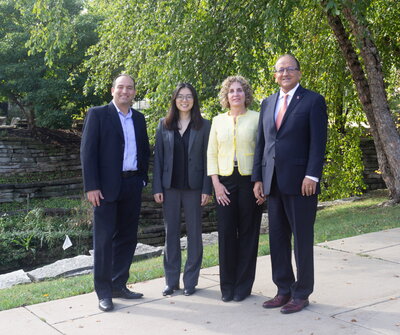
By Huan Song
Sepsis is a life-threatening medical condition that develops when the body's immune system overreacts to an infection and triggers widespread inflammation. This quick-moving condition can lead to organ failure and even death in a matter of hours, making it one of the most deadly and costly conditions for hospitals in the U.S.
Early detection of this condition is a critical need in the healthcare industry, and an Illinois research team that includes Illinois professor Hee-Sun Han, the Mark A. Pytosh Scholar, has received a $2 million grant from the National Institutes of Health to develop a rapid and accurate point-of-care device for early detection of sepsis.
The research team is led by Rashid Bashir, professor in bioengineering and the Carle Illinois College of Medicine and dean of The Grainger College of Engineering and also includes Illinois bioengineering professor Enrique Valera, and Dr. Karen White, an intensive care unit physician at Carle Foundation Hospital. Professor Han contributes to the team expertise in microfluidics, bioimaging, nanotechnology, and materials chemistry, which the Han research group leverages to invent new bioanalytical technologies.
Currently, the process to diagnose sepsis is qualitative and non-specific. Physicians measure a patient's vital signs and wait for results from blood culture that may take up to five days for results. This process takes much longer than desired which leaves a huge gap in providing timely treatment at the onset of infection. But there are several promising biomarkers for sepsis based on the body's inflammatory response.

“The proposed point-of-care microfluidic device will for the first time combine the analysis of cell-surface proteins and plasma-proteins biomarkers from the same sample of blood,” Valera said.
Specifically, this lab-on-a-chip device will provide a complete white blood cell count and quantification of CD64 expressions on neutrophile (nCD64), procalcitonin (PCT), C-Reactive Protein (CRP) and Interleukin 6(IL-6), and use of machine learning approaches to integrate clinical data with measurements from these devices.
Because there are currently no tools in existence with this capability, this proposed approach could transform how sepsis is currently diagnosed by making it possible to monitor a patient's inflammatory status in real-time with a bedside test.
Valera said, “such a device can contribute not only to the early diagnosis of sepsis, but also to lead to accurate fingerprinting of sepsis which will allow stratification of the risks caused by the disease.”
The device and the approach will be tested with clinical samples at the Stephens Family Clinical Research Institute at the Mills Breast Cancer Institute, located on the main Carle campus in Urbana, Illinois. Research collaborator Dr. Karen White has extensive experience in the categorization of sepsis and will lead clinical studies with this device.
In a separate project — as a 2021 Johnson & Johnson WISTEM2D Scholar Award winner — professor Han will be developing a new imaging-based methodology to study RNA-RNA interactions in breast cancer. She is also a faculty member of the Carl R. Woese Institute for Genomic Biology, the Center for Biophysics and Quantitative Biology, and the Neuroscience Program on campus.